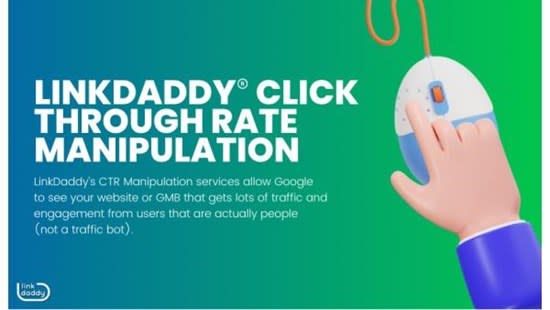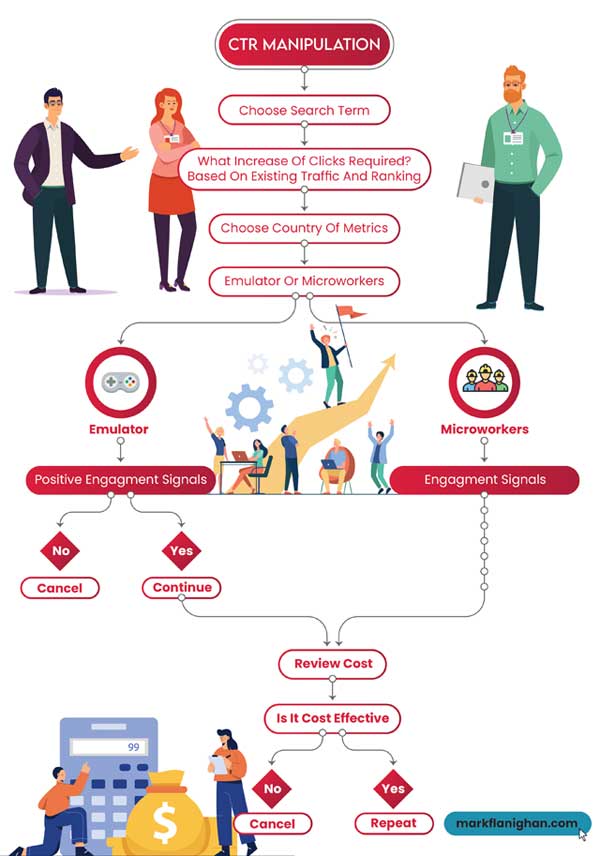Exploring the Relationship In Between CTR Adjustment Providers and Customer Actions
In the world of electronic advertising and marketing, the influence of click-through rate (CTR) adjustment services on user habits continues to be a complex and appealing topic. As online platforms significantly rely on CTR metrics to determine the success of material, items, and solutions, understanding exactly how these controlled prices influence user engagement and decision-making processes is vital. The interaction in between CTR manipulation and user actions questions about authenticity, credibility, and the ethical effects of such techniques. By exploring the complex partnership in between CTR control services and individual actions, intriguing insights emerge that might improve our understanding of electronic marketing strategies and their effects on consumers.
Impact of CTR Adjustment on Habits
Evaluating the influence of Click-Through Price (CTR) control on user actions discloses vital insights into the characteristics of online interaction. CTR manipulation entails synthetically inflating the variety of clicks on a certain web link or promotion to deceive customers and internet search engine. This method can lead to an altered understanding of a webpage's appeal or relevance, inevitably affecting customer habits.

Additionally, CTR adjustment can skew the data utilized by formulas to personalize individual experiences. This can cause users being served web content that does not align with their preferences or passions, inevitably resulting in a decline in user fulfillment and involvement. Understanding the effect of CTR adjustment on user actions is necessary for preserving transparency and rely on online interactions.
User Interaction With Adjusted CTR
Customer involvement with manipulated CTR information often results in manipulated assumptions of on-line content popularity and relevance. When users communicate with material based on synthetically inflated Click-Through Fees (CTR), they might think that certain information, products, or services are much more popular or trustworthy than they in fact are. This can lead to customers making choices based upon deceptive information, causing possibly undesirable results.
Interaction metrics like likes, shares, comments, and time invested in a page are usually influenced by CTR control. Users may be more likely to involve with material that shows up to have greater engagement prices, additionally continuing the cycle of skewed assumptions. Consequently, material creators and marketers might prioritize producing web content that produces high CTR instead of concentrating on developing really valuable and pertinent product.

Psychological Results of CTR Adjustment

Additionally, the mental effects of CTR manipulation can additionally show up in altered decision-making processes. Users may be more inclined to click material solely based upon its regarded appeal, rather than its actual value or significance to their requirements. This behavior shift can result in a superficial involvement with on the internet content, where users might ignore high-grade however much less prominent offerings in favor of those with unnaturally enhanced CTRs.
In essence, the psychological implications of CTR control highlight the value of keeping transparency and authenticity in Going Here on-line interactions to promote real customer engagement and trust fund.
Ethical Considerations in CTR Adjustment
Taking into consideration the ethical implications of controling click-through prices (CTR) in on the internet platforms is important for keeping integrity and count on within the digital environment. CTR control elevates issues concerning tricking users, distorting data analytics, and compromising the trustworthiness of on-line material. One major honest factor to consider is the prospective influence on customer autonomy and decision-making. By synthetically pumping up CTR, customers may be misguided right into clicking web links or advertisements they would certainly not have actually picked or else, causing an insincere online experience. Moreover, CTR manipulation can skew the efficiency metrics that services depend on to make strategic decisions, ultimately influencing market competitors and customer count on.
Another moral facet to consider is the fairness of manipulating CTR to obtain an unjust advantage over competitors. Participating in such practices not just breaches principles of fair game yet likewise threatens the depend on that customers position in online platforms. It is necessary for businesses and digital marketers to maintain ethical criteria in their techniques to make certain openness, trustworthiness, and lasting sustainability in the on the internet environment.
Ramifications for Digital Advertising
With the enhancing dependence on electronic platforms for advertising purposes, the technique of manipulating click-through prices (CTR) positions considerable effects for the effectiveness and stability of digital advertising techniques. CTR control can lead to manipulated information analytics, misguiding marketers right into thinking that their campaigns are carrying out much better than they actually are. This can lead to misallocation of resources, with business purchasing underperforming approaches based upon falsified CTRs. In addition, when individuals understand that CTRs have been adjusted, it can wear down count on the brand name, resulting in lasting unfavorable repercussions for customer commitment and brand track record.
In addition, making use important site of CTR adjustment services can produce an unfair affordable landscape, where business that involve in such techniques obtain a man-made benefit over those that abide by moral advertising and marketing requirements. This can stifle innovation and creative thinking in digital advertising and marketing, as success comes to be even more about control methods than providing authentic worth to consumers. Inevitably, the implications of CTR manipulation for digital advertising expand beyond temporary gains, impacting the overall sustainability and reliability of advertising and marketing efforts in the digital realm.
Conclusion
To conclude, the connection in between CTR adjustment solutions and user behavior is intricate and diverse. The effect of CTR manipulation on behavior, customer interaction with adjusted CTR, emotional effects, honest factors to consider, and effects for digital advertising all play a function in forming this relationship. Understanding these characteristics is vital for marketing experts and scientists alike in order to browse the ethical effects and make best use of the effectiveness of their electronic advertising and marketing methods.